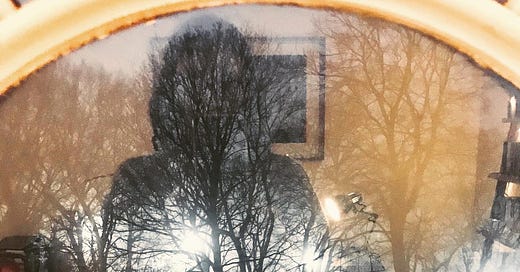Darkness has a profound effect on our internal landscape, so suggests British visual artist, Sam Winston. It can sharpen perception, shore up resilience and amplify the imagination. In the depths of darkness, we are thrown back on ourselves.
I’ve long welcomed winter as an opportunity to retreat, turn inward and reset my energy levels. Winston’s relationship with darkness, though, is completely immersive: in 2016 he occupied a blacked-out studio where for a month he lived and worked without light. Since then, he has undertaken several ‘darkness residencies’ and commissioned other artists and writers to do the same. What emerges from the depths of this solitude, it seems, is a more profound knowing, which translates itself to the page or the canvas—and to the life resumed after the darkness.
But what happens when we re-emerge blinking into the light?
Winston’s experiment has been on my mind these past days, at the end of a northern-hemisphere winter and as many of us inch our way back, in the wake of two years of pandemic disruption, into a life that is more outwardly-facing. But in the desire to welcome the warmth and the sun, the lengthening of days and more frequent contact with others, there’s perhaps a danger of losing what we gained in the darkness: the resonant voice of the soul, more amplified because it has been given more space; fresh insights, increased self-knowledge.
Winter to spring—like all transitions—is an interstitial pause. It involves a shift from one state to another, from closed to open, from dark to light. In this time, I find myself wanting to recognise that point of transition, to give expression—and to honour—what the darkness (though long and at times uncomfortable) has taught me.
I invite you to do the same.
Because there is a potential gift of seeing things anew. Winston refers to this renewed perception as ‘a delicate sight’ (the name of his website). How do our eyes, unused to such sensory stimulation, readjust? In an article about his experience in The Economist (paywall), Winston relates the moving moment when he sees his girlfriend again after his month in the dark. She led him out blindfolded so he could gradually adjust to the difference in light. And she was astonished to find, as he opened his eyes, that they had changed colour to a deeper hue. It is as though not just Winston’s perception but his eyes themselves had regenerated during his time in the dark.
Soon (on 20 March), we mark the beginning of summer at the vernal equinox—the point in the year when light and dark in the day are equally balanced. Before launching into the summer and embracing the light, my invitation is this: pause and reflect on what winter has taught you. What insights have you gained in the darkness? Has your imagination been ignited through the turning inward to your deeper self—and in what ways?
As you take off the blindfold and welcome the return of the light, notice what you see afresh. In your immediate environment—your home, neighbourhood, your workplace—what colours and textures stand out now?
And then, as you are reunited after that absence with those closest to you, ask yourself this: what beauty do you see in front of you?
What, in this moment—and with these new eyes—does love look like now?
You can watch Sam Winston’s film about darkness and darkness residencies here.





I was pulled gently into the writing and then into watching the video, in its entirety. How very stirring and interesting and a bit like being on a similar exploration to those in the video. I feel in a different space now - and wonder where I've been. Where am I now? YES. Thanks for sharing. x